FOLLOWING his address at last weekend's 'Towards a New Ireland' conference in London, the Irish Post talked to Sinn Féin president Gerry Adams about the party's past, the affect of the IRA's bombing campaign on the Irish in Britain and the questions regarding his brother.....
Niall O'Sullivan: We did a poll recently asking the Irish in Britain how they would vote in a general election and Sinn Féin did very well. You also did very well in a similar poll by ballotbox.ie. Why is Sinn Féin so popular outside of Ireland?
Gerry Adams: Well we are also quite popular inside Ireland.
I actually find it very much in my travels that a lot of people did not get a sense of their Irishness until they left the country.
And a lot of people who went, historically, were very annoyed that they could not stay in the place, whereas a lot of young people going away now are very well educated. They have a lot of confidence. And they have opinions.
We do think one of the reasons why the Government penalised the under-25s in the Budget is because they would see those as the demographic of people who would most tend to vote for Sinn Féin. So they don’t care about that demographic.
Why do you feel you are more popular outside Ireland than inside Ireland though? What are you offering that other parties are not?
Well we are also the only party that tries to keep in touch with the Diaspora, both in terms of regular visits to Australia, to England, to North America and indeed to other parts of the world.
So we would have a connectiveness with people who are exiled. A lot of the great surges forward in Irish republican history came from outside Ireland. The 1916 rising was funded by the children of the Famine. The connectiveness here with Irish republicanism is centuries old.
Does it surprise you that you retain that popularity here given that, for a lot of Irish people who came over here in the 50s, 60s and 70s, it was a very difficult time to be Irish and that was largely because of the IRA bombing campaign in the North of Ireland and in Britain. Do you feel any sense of involvement in that?
I think there has been historic anti-Irish feeling here that was stoked up during the armed conflict. Obviously that took on an intensity, but it predates that, if you go back to the old Punch cartoons and the way the Irish were caricatured.
And that is no accident. It may at very base level with ignorant people just form part of their way of looking at the world, which is uninformed and ignorant. But you cannot go and colonise people without first of all demonising them.
You could not have an English Government saying. “These Irish are wonderful. They are very intellectually and spiritually advanced, have a wonderful language and literature of their own, have brilliant music, they have their own laws.”
But during the 70s and 80s when there was not the same level of dialogue that there was in the 90s, you as a republican leader were certainly involved in that process. Do you feel that you could have taken actions that would have prevented some of the anti-Irish abuse that happened in this country at that period of time?
Well it is hard to know. It is not something that I have reflected on at a personal level. I was banned for a large part of my political life from travelling here. I was banned from the airwaves too. I travelled here whenever I could.
I am intrigued by the idea of the Diaspora. I am intrigued by the effect it has on us as people. I am glad that things here are much better. I know there were examples given of racism in the conference, but I think a huge seismic shift that has come about.
And we have to remind ourselves that that wasn’t least because of some very progressive and courageous English people and people from other ethnic backgrounds who stood beside the Irish; people like Ken Livingstone and Jeremy Corbyn and John McDonnell and others. Chris Mullin in very hard times stood up and said: “This is not right.”
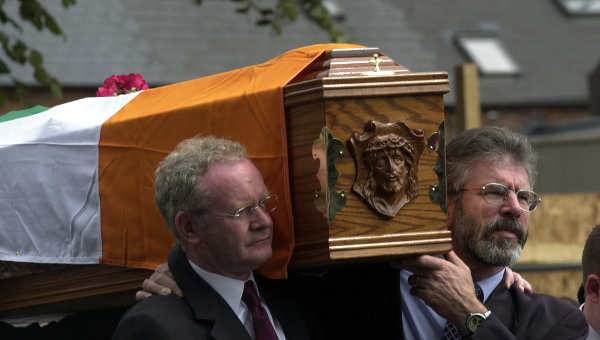 Adams and fellow Sinn Fein politician Martin McGuinness carry the coffin of IRA leader Joe Cahill in 2004
Adams and fellow Sinn Fein politician Martin McGuinness carry the coffin of IRA leader Joe Cahill in 2004But some of the people here blame you personally. How would you feel about that? About not entering dialogue sooner and failing to condemn IRA attacks immediately when you were seen to sympathise and people over here were accused of being sympathisers too?
The question of dialogue or not engaging in dialogue is a charge that cannot be levelled at Sinn Féin. For as long as I have been even familiar with Sinn Féin and with republicanism, dialogue, conversation, the battle for ideas, has informed all of that.
You also have to remember that this is Sinn Féin with electoral status. It is not just a matter of not talking to Sinn Féin. Those who voted for us were disenfranchised. I represented west Belfast for a very long time and we had a battle even to be able to represent in an adequate and proper way…
My point is that there is an understanding of the extreme inequality and hardship that existed in the North, but there is a sense also here among the Irish in Britain that they were victims of a game that a lot of them did not want to be involved in. Do you feel any sense of…
No I don’t. But I was not dealing with injustice or anything else, I was dealing just with the charge that you made about dialogue and that Sinn Féin could have entered into dialogue sooner.
The historical record shows the number of times when the British Government rejected – and this is Labour as well by the way – requests by me as an elected official to engage in a dialogue.
I understand that the conflict, and particularly in the wake of IRA actions, brought about a particular focus on people who had Irish accents or who were known to be Irish. That is to a certain degree understandable. I think it is very regrettable.
In my remarks today I said there were things that were done that cannot be undone and we cannot erase the past. But what we can do is make sure it does not repeat itself.
But today you spoke at length about the importance of dealing with the past. Some people would say that if IRA attacks had been condemned outright, the Irish in Britain could have been spared that abuse. Do you think that should have been done?
No. My position, and we are dealing with history now because the Good Friday Agreement is 15 years old and next year the first IRA cessation was declared 20 years ago.
So my position on the IRA is very straightforward. I do not associate myself, I don’t distance myself. There are things the IRA did that should not have been done; I am on the record at that time of being critical.
But in terms of the general principle: Were they entitled in the face of a militarised situation living under occupation to respond in an armed way? Yes they were.
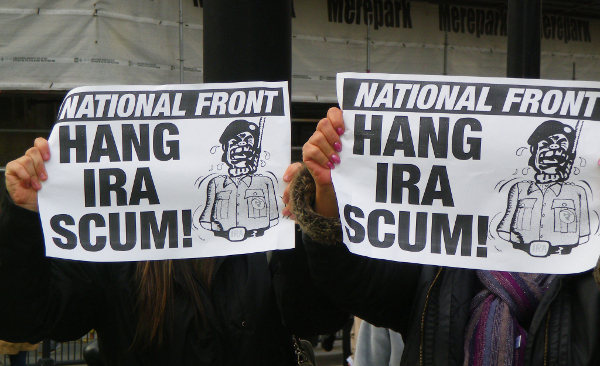 The attack of a Liverpool-Irish parade by a far-right group last year was seen as a return to a time when the Irish in Britain were forced to live in the shadows because of the IRA bombing campaign.
The attack of a Liverpool-Irish parade by a far-right group last year was seen as a return to a time when the Irish in Britain were forced to live in the shadows because of the IRA bombing campaign.You mentioned in your speech that some members of the British State have been reluctant to change and spoke in particular about David Cameron’s refusal to give the Finucane family the inquiry they were promised. Could you elaborate on how the State is obstructing change and who in particular is responsible?
Well there are very important elements of the Good Friday Agreement and subsequent agreements that I numbered.
The Bill of Rights, there is no Bill of Rights. For years the British Government hid behind the fiction that they had established a commission to look at a Bill of Rights for all of the United Kingdom and therefore they could not bring in anything in in the North and it would be wrong and so on and so on.
But after years of delay, what did the commission recommend? That there should be a specific Bill of Rights for the North. That it was unique. That it was coming out of conflict. That it was a place that needed special treatment.
Acht na Gaeilge – The Irish language was illegal until very recently. It is still illegal in the courts. Welsh is not illegal in the courts in Wales. Scotch Gaelic is not illegal in the courts in Scotland. And interestingly enough, it used to be. And when devolved administrations were put in place, in those states or countries they immediately got rid of the illegality.
The proper focus on getting, on the basis of objective need, into those communities which are most affected by discrimination and disadvantage and educational underachievement and lack of jobs…
Who do you blame for these failures?
The British Government.
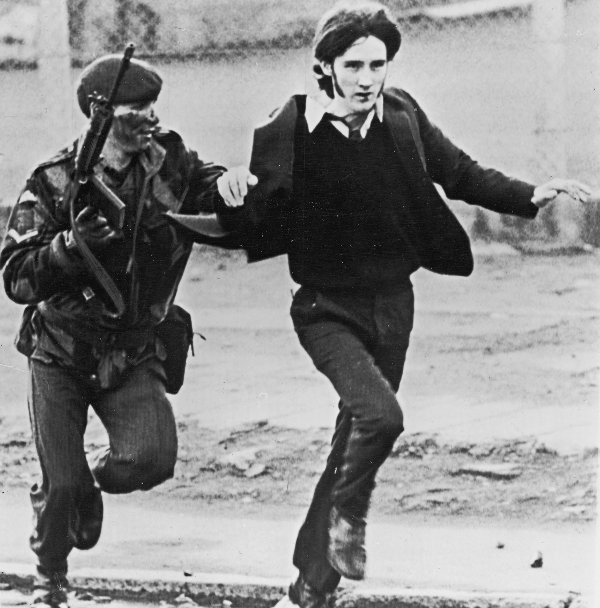 A British paratrooper takes a captured youth from the crowd on 'Bloody Sunday'. The IRA were entitled to respond with violence to the British "occupation" of the North of Ireland, according to Gerry Adams.
A British paratrooper takes a captured youth from the crowd on 'Bloody Sunday'. The IRA were entitled to respond with violence to the British "occupation" of the North of Ireland, according to Gerry Adams.Do you blame anyone in particular?
No I don’t blame anybody in particular. But obviously the British Prime Minister, the buck has to stop with the British Prime Minister.
I think an interesting thing happened. I think for 10 years the Labour Government under Tony Blair dealt with the Peace Process. You heard Jonathan Powell (a close political aide of Blair during the Good Friday negotiations) say it was the most important political thing in his life. Tony Blair says the same thing. So does Bill Clinton. So does George Mitchell. All the same players make the same case.
When they left I think the officials, who were probably senior officials, who are the gate keepers, who probably were upset that Sinn Féin had such access over those 10 years, that they were delighted to close all that down.
So Mr Cameron, for example in the case of Pat Finucane. I cited Pat because his mother died last week. She was very elderly and she lived in the hope that what they had agreed to. In Weston Park there was a commitment to establish an independent inquiry into the killing. They just tore it up.
And the OTRs (On The Runs). I cited John Downey (who will go on trial in January for the Hyde Park Bombing), who was there this morning. He was one of the people who received a letter saying he was not wanted now.
Today is all about dealing with the past. How do you expect to be an authority on that given your refusal to answer questions about the circumstances on your brother’s past?
Well I did not. When did I do that.
When you refused to elaborate on your initial statement and blamed the media for engaging in a "witch-hunt"...
Well I didn’t…
Okay, maybe you would be willing to answer a few queries now then…
What you need to know is that in 1987, Áine and her mother made the complaint against her father. It was on the record, detailed, to the RUC. It was also reported to the social services.
But you did not come forward between 2000 (when Gerry says his brother confessed to him about abusing his daughter) and 2007. Do you feel guilty about that?
Well I think there is a huge amount of disinformation about this issue and it has been seized upon…
I recognise that, but I mean to ask about your own personal feelings…
You have to let me answer.
So there are two phases to this. The first phase was when Áine was a minor and she went to the RUC and the social services with her mum. The second phase was when she was an adult. In the second phase she wanted her father, she being an adult, to acknowledge what he had done and to apologise.
She asked me to help. I could have said ‘I cannot help. Go back to the police’. I could have said that. But I didn’t. I tried to help. On a number of occasions in that process Liam agreed to come forward to acknowledge and to express regret for what he did.
He failed to do that. Áine went back to the PSNI and then made the second complaint. I co-operated with the PSNI. I co-operated with the Public Prosecution Service. I gave evidence in court against my brother.
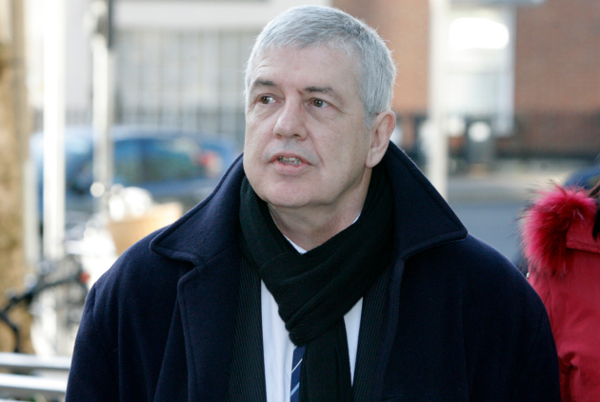 Gerry's brother Liam was convicted of raping and abusing his daughter Áine earlier this month. The abuse happened between 1977 and 1984, when she was aged between four and nine. Gerry has said Liam confessed to him in 2000 that he had abused Áine.
Gerry's brother Liam was convicted of raping and abusing his daughter Áine earlier this month. The abuse happened between 1977 and 1984, when she was aged between four and nine. Gerry has said Liam confessed to him in 2000 that he had abused Áine.But during this time your brother was working with young people and you have previously said you dealt with the situation in the best way possible. On reflection, do you stand by that? Do you have no sense that you could have done things differently?
I think the only way you can judge this if you would, and you are a young person, and we are dealing with events that happened 30 years ago and then subsequently, is if it happened in your family – and God forbid that it would – and you had to deal with it.
You are dealing with an adult. You are not dealing with a minor. You are dealing with a young woman who had her own view of what she wanted to do.
The only way people can make a judgment of me is to put themselves in my shoes. Remember that Liam, even during the trial, denied everything. I had no evidence of anything other than my word against his.
I mean specifically with regard to the fact he was working with minors at that stage. Do you feel any sense that you put them in danger?
Well on two occasions in the Belfast situation I actually reported the matter. And secondly, at all times I told Liam that he should not be working with young people.
But that was seven years later. Do you not think you should have come forward sooner? I presume you are referring to 2007 and 2009 here when you talk about coming forward?
I am talking about the entire process. This is a process that lasted for some considerable time – too long.
Did you come forward twice before 2007 or was that the first time you came forward to the PSNI to make a statement?
Well I am not… You are hitting me with dates here, which I am just not…
Okay. But the point is that there was a considerable length of time between the confession and you coming forwards. Do you regret the amount of time you took?
No I don’t. The police had copious statements from Áine, detailed statements from Áine, plus whatever evidence was given. And I have to keep coming back to this. This was an adult dealing with this issue in a particular way.
You asked do I have regrets and I do not want to state this as a regret, but this is essentially a family matter. Until Áine went back to the PSNI this was a family matter. You also have to bear in mind that over the course of all of this we discovered that my father was an abuser.
That was before the confession though wasn’t it?
You should not get into this business as if Liam made this big confession.
You gained a lot of respect because of the stance you took on the Catholic Church (on your Léargas blog) when the child sex abuse allegations came out. How is what you did different to what members of the Church did?
There is no comparison. If you compare institutionalised clerical abuse of young people, perhaps thousands for all that we know, covered up, children being sworn to secrecy, the perpetrators being protected, with a family situation, there is no comparison whatsoever.
And to those who make that charge, I reject it absolutely. I also reject the notion that I did anything wrong. I may have big falls and failings, like everybody else, but I did my best and I continue to do my best in a very difficult situation.
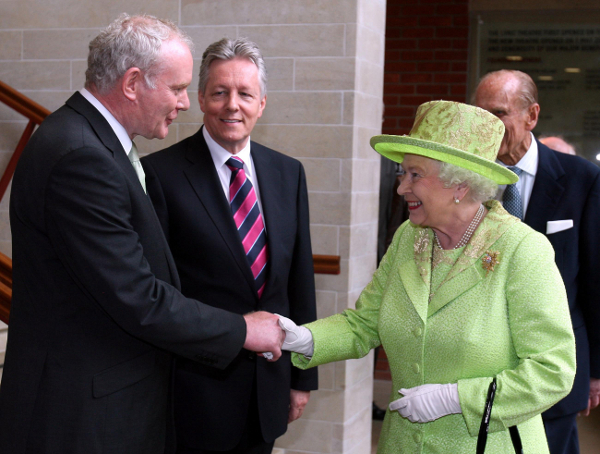 The handshake between republican Martin McGuinness' and the Queen during her State visit to Ireland in 2011 was hailed as an "historic" event. But Adams "would need persuading" that the British monarch should be at Ireland's Easter Rising celebrations in 2016 - when he may be Tánaiste
The handshake between republican Martin McGuinness' and the Queen during her State visit to Ireland in 2011 was hailed as an "historic" event. But Adams "would need persuading" that the British monarch should be at Ireland's Easter Rising celebrations in 2016 - when he may be TánaisteFinally, would you invite the Queen to the 2016 Easter Rising commemorations if you are the Tánaiste at the time, as recent opinion polls suggest you will be?
I think it is good that the English Queen and indeed other dignitaries can visit Ireland. And it may be that that may be appropriate around some commemorations of the First Great War or some other event.
A republic was declared in 1916. That republic has not yet been established. It was a national republic. What we have in place at the moment is a 26-county state, which falls far far short of being a real Republic.
So I would have to be persuaded that the English monarch should be invited to that. But she should be invited to everything else.
So you are not convinced she should be there?
‘I would need persuading’ is what I said.

